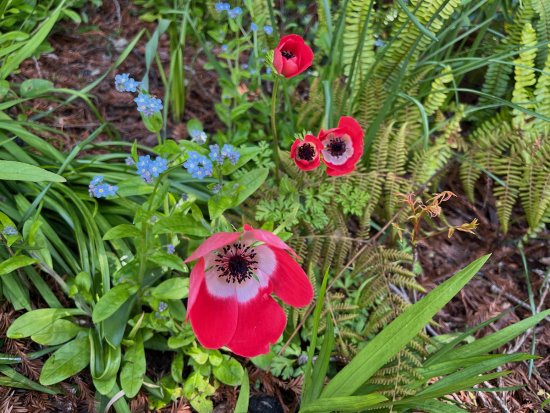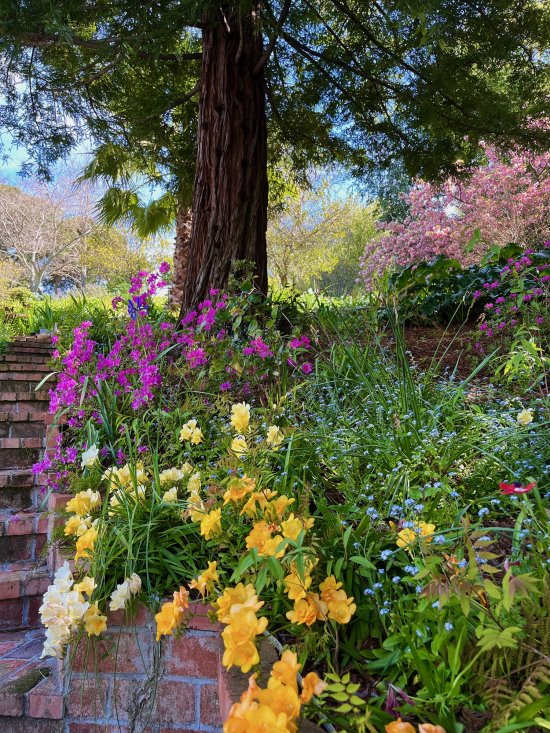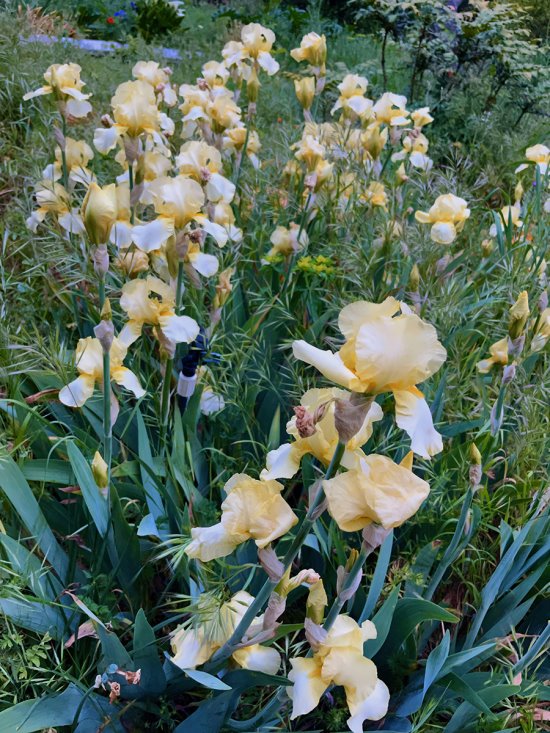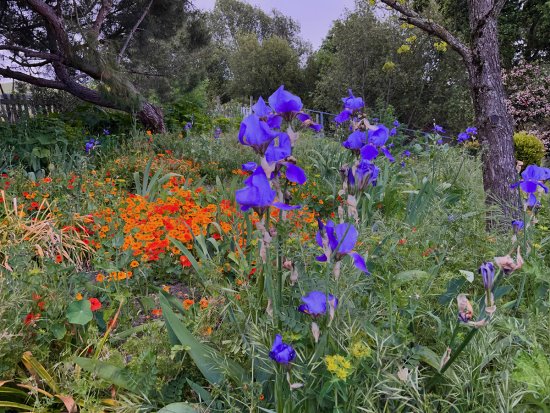
| ||||||
Do you ever go to a restaurant extremely hungry and when you peruse the menu, you order more than you could ever eat? I am guilty of this trait whenever I visit a nursery or garden center. Before I go, I usually create a list of the four or five plants that I want and am ready to plant. But once there, all the magnificent flora intoxicates me with their beauty, and I end up buying more than I have time to put in the ground.
Not this year. I am exerting self-control and keeping it small. One of the reasons for limiting my purchases is that my garden is not sufficiently prepared for adding extras. Before I left on my European expedition, I thought I had everything under control. I had followed my own advice of pruning, weeding, feeding, seeding, and mulching the landscape. The few weeds that remained resembled short groundcover. But because of the rain and fog providing extra moisture, and the warm, sunny days whilst I was away, ideal conditions for abundant growth of both weeds and flowers were created. Upon my return, I was greeted by a gorgeous green jungle, albeit totally out-of-control blooms and blossoms as well as weeds as tall as I am.
The tender tiny mustard greens that I had been collecting for salads and stir-fry now towered six or seven feet. Grasses blown in from the hills mingled with the purple and yellow bearded iris, euphorbia, and nasturtiums. For the next few months, I will labor weeding, weeding, and weeding. Inch by inch.
Despite the weeds, the garden has erupted into a colorful canvas of fragrant flowers. Lilac, wisteria, jasmine, mock orange, rose, and freesia compete for the title of most glorious blooms with the most intoxicating perfume.
It is time to plant my vegetables and herbs, and this is where I am starting small. In two containers outside the kitchen door, I bought and planted two tomato plants, a red bell pepper, shallots, scallions, basil, dill and thyme. In my vegetable garden, I started another artichoke, eggplant, squash and lettuce. By purchasing four-inch pots and six-packs instead of gallons, I had the time, and the space, to get these in the soil immediately. In a vintage wheelbarrow, potatoes and onions are growing. Companion planting is a strategy that I implement to increase the success of my crops. To hungry insects and pests, the smell of onions is unpleasant, making them an excellent companion plant for many other vegetables including the members of the Solanaceae (nightshade) family of tomatoes, potatoes, eggplants, and peppers. Onions also act as a mild aphid repellant to roses. Here are other vegetables that will benefit from planting onions, garlic, or other alliums as companions:
Beets
Brassicas
Carrots
Chamomile
Dill
Lettuce
Parsnips
Parsley
Spinach
Strawberries
Don't plant onions with asparagus, peas, beans, or sage as the flavor will be negatively affected and the growth of the plants will be stunted.
Over the next few weekends, I'll be able to finish weeding areas where I want to plant more tomatoes, zucchini, sweet corn, beans and cucumbers. Beans, corn and zucchini I'll plant by seed, and other vegetables I'll buy in small containers. I will continue the succession seeding of beets, carrots, and greens that my family enjoys eating. I'll add marigolds to repel other rodents and nematodes throughout the garden.
I am an advocate for growing my own groceries because I know that my soil is free of chemicals, insecticides, pesticides, and other harmful matter. You can also grow your own food even if you have a small space. Whether you buy a decorative container or repurpose a vessel, sanitize it with bleach and water. Rinse well. Add pebbles for drainage and rich potting soil. Plant what you like to eat. Keep your pot watered. Feed with organic fertilizers based on the requirements of what you plant. You will have produce that is delicious, nutritious, and healthy.
Most people don't know that many of the fruits and vegetables that we purchase in the supermarket or even at Farmers' Markets are filled with chemicals. Even if you are on a strict budget, the following Dirty Dozen of vegetables and fruits should only be purchased as organic produce or grown in your garden. Sadly, these are vegetables and fruits that most people enjoy and believe are good for us. Beware . they are only good for you when they are grown without chemicals.
In order of the most chemicals used on each crop, The Dirty Dozen includes:
1. strawberries
2. spinach
3. collard greens, kale, mustard greens
4. peaches
5. pears
6. nectarines
7. apples
8. grapes
9. peppers and hot peppers
10. cherries
11. blueberries
12. green beans
A small amount of sweet corn, papaya, and squash is grown from genetically modified seeds. Always look to plant seeds that say "non-GMO".
The following fruits and vegetables are called The Clean Fifteen. You may purchase them anywhere, yet again, what you grow yourself will always be more beneficial.
1. avocado
2. sweet corn
3. pineapple
4. onions
5. papaya
6. frozen sweet peas
7. asparagus
8. honeydew melon
9. kiwi
10. cabbage
11. mushrooms
12. mangoes
13. sweet potatoes
14. watermelon
15. carrots
Finally, in May, plant annuals, perennials, and summer bulbs suited to your microclimate conditions as the weather warms. Cosmos, petunias, salvia, zinnias, yarrow, Agastache, penstemon, asters, marigolds, and echinacea are colorful choices that also attract pollinators. For bulbs, consider Lily of the Nile (Agapanthus), tuberous begonia, caladium, canna, dahlia, gladiolus, and lilies. Summer blooming plants need warm, well-draining soil. Always pay attention to the directions or plant tags. Keep everything watered sufficiently.
Start small and increase as you have the time and space. Don't buy too many plants at once if you won't be able to get them in their forever home within a few days. Make sure your area is weeded well before you sow any seeds. Cut high grasses and remove debris around the perimeter of your house as fire prevention. Inch by inch, it's a cinch!
Remember mom on Mother's Day with a plant or bouquet and enjoy mild May days.
Happy Gardening. Happy Growing! Happy Mom's Day!
PS: From May through June 30, DONATE your gently worn or new shoes to support women and families in poverty in developing countries as part of the Be the Star You Are!r charity Shoe Drive. Please tie shoes together or rubber band pairs to keep them together. Drop off at sponsor locations:
Mark Hoogs
State Farm Insurance
629 Moraga Road, Moraga
925-254-3344
www.TeamHoogs.com
5 A Rent-A-Space
455 Moraga Rd. #F, Moraga
925-631-7000
https://5aspace.com/
For more information, visit https://www.bethestaryouare.org/shoedrive




Reach the reporter at:
